人教版pep初中七年级英语上册教案全册
- 格式:doc
- 大小:437.01 KB
- 文档页数:86
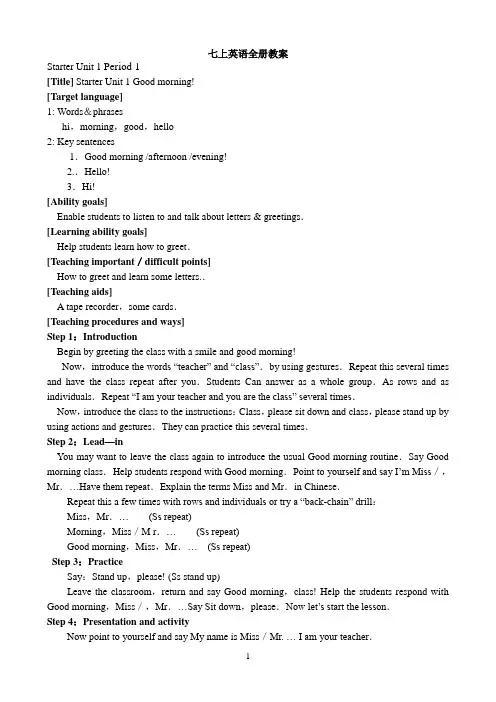
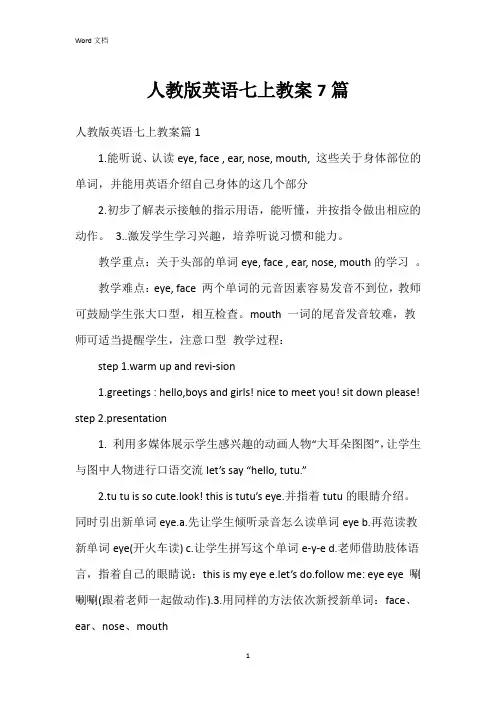
人教版英语七上教案7篇人教版英语七上教案篇11.能听说、认读eye, face , ear, nose, mouth, 这些关于身体部位的单词,并能用英语介绍自己身体的这几个部分2.初步了解表示接触的指示用语,能听懂,并按指令做出相应的动作。
3..激发学生学习兴趣,培养听说习惯和能力。
教学重点:关于头部的单词eye, face , ear, nose, mouth的学习。
教学难点:eye, face 两个单词的元音因素容易发音不到位,教师可鼓励学生张大口型,相互检查。
mouth 一词的尾音发音较难,教师可适当提醒学生,注意口型教学过程:step 1.warm up and revi-sion1.greetings : hello,boys and girls! nice to meet you! sit down please! step2.presentation1. 利用多媒体展示学生感兴趣的动画人物“大耳朵图图”,让学生与图中人物进行口语交流let’s say “hello, tutu.”2.tu tu is so cute.look! this is tutu’s eye.并指着tutu的眼睛介绍。
同时引出新单词eye.a.先让学生倾听录音怎么读单词eye b.再范读教新单词eye(开火车读) c.让学生拼写这个单词e-y-e d.老师借助肢体语言,指着自己的眼睛说:this is my eye e.let’s do.follow me: eye eye 唰唰唰(跟着老师一起做动作).3.用同样的方法依次新授新单词:face、ear、nose、mouth4.powerpoint制作:打开幻灯片后每点击一身体部位就会出现相应的单词。
(注mouth一词的尾音发音较难,适当提醒学生,注意口型。
)5.认读face、ear、eye、nose、mouth的单词卡片和图片。
step3:practice1.let’s do: eye eye 唰唰唰ear ear 呼呼呼nose nose 闻闻闻mouth mouth 巴巴巴face face 拍拍拍2.i say you do.(老师说,学生快速做相应的动作,然后找一位学生出来做出动作。
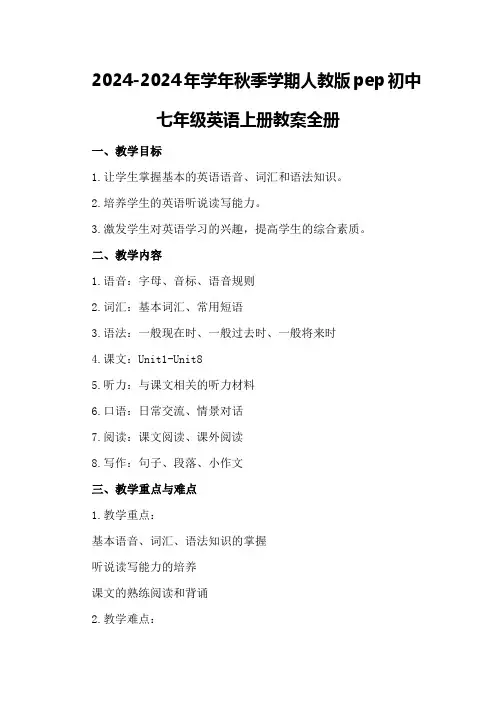
2024-2024年学年秋季学期人教版pep初中七年级英语上册教案全册一、教学目标1.让学生掌握基本的英语语音、词汇和语法知识。
2.培养学生的英语听说读写能力。
3.激发学生对英语学习的兴趣,提高学生的综合素质。
二、教学内容1.语音:字母、音标、语音规则2.词汇:基本词汇、常用短语3.语法:一般现在时、一般过去时、一般将来时4.课文:Unit1-Unit85.听力:与课文相关的听力材料6.口语:日常交流、情景对话7.阅读:课文阅读、课外阅读8.写作:句子、段落、小作文三、教学重点与难点1.教学重点:基本语音、词汇、语法知识的掌握听说读写能力的培养课文的熟练阅读和背诵2.教学难点:音标发音的准确性语法规则的灵活运用课外阅读的理解与分析四、教学进度安排1.第一周:Unit11.1Greetingsandintroductions 1.2Numbersandages1.3Colors2.第二周:Unit22.1Schoolsubjects2.2Classroomobjects2.3Dlyroutines3.第三周:Unit33.1Foodanddrink3.2Describingfood3.3Makingrequests4.第四周:Unit44.1Familymembers4.2Describingpeople4.3Talkingaboutfamily5.第五周:Unit55.1Time5.2Daysoftheweek5.3Activities6.第六周:Unit66.1Weather6.2Clothing6.3Describingtheweather7.第七周:Unit77.1Inthelibrary7.2Intheclassroom7.3Inthesupermarket8.第八周:Unit88.1Sports8.2Describingsports8.3Talkingaboutsports五、教学方法1.采用任务型教学法,让学生在实际语境中学习英语。
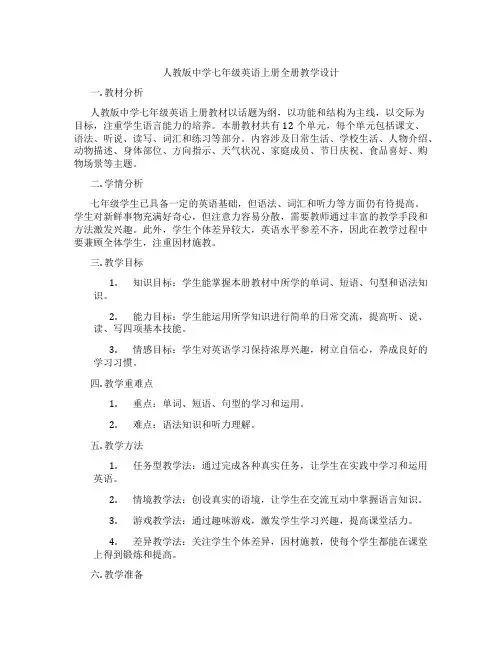
人教版中学七年级英语上册全册教学设计一. 教材分析人教版中学七年级英语上册教材以话题为纲,以功能和结构为主线,以交际为目标,注重学生语言能力的培养。
本册教材共有12个单元,每个单元包括课文、语法、听说、读写、词汇和练习等部分。
内容涉及日常生活、学校生活、人物介绍、动物描述、身体部位、方向指示、天气状况、家庭成员、节日庆祝、食品喜好、购物场景等主题。
二. 学情分析七年级学生已具备一定的英语基础,但语法、词汇和听力等方面仍有待提高。
学生对新鲜事物充满好奇心,但注意力容易分散,需要教师通过丰富的教学手段和方法激发兴趣。
此外,学生个体差异较大,英语水平参差不齐,因此在教学过程中要兼顾全体学生,注重因材施教。
三. 教学目标1.知识目标:学生能掌握本册教材中所学的单词、短语、句型和语法知识。
2.能力目标:学生能运用所学知识进行简单的日常交流,提高听、说、读、写四项基本技能。
3.情感目标:学生对英语学习保持浓厚兴趣,树立自信心,养成良好的学习习惯。
四. 教学重难点1.重点:单词、短语、句型的学习和运用。
2.难点:语法知识和听力理解。
五. 教学方法1.任务型教学法:通过完成各种真实任务,让学生在实践中学习和运用英语。
2.情境教学法:创设真实的语境,让学生在交流互动中掌握语言知识。
3.游戏教学法:通过趣味游戏,激发学生学习兴趣,提高课堂活力。
4.差异教学法:关注学生个体差异,因材施教,使每个学生都能在课堂上得到锻炼和提高。
六. 教学准备1.教材、课件和教学资源:教师需提前准备教材、课件及相关教学资源。
2.教学工具:多媒体设备、黑板、粉笔等。
3.教学素材:图片、视频、音频等。
4.作业布置:为学生准备适量的课后作业,巩固所学知识。
七. 教学过程1.导入(5分钟)利用图片、视频或音频等素材,引入本节课的主题。
例如,通过展示一幅图片或播放一段视频,让学生猜测图片或视频中的内容,从而引出本节课的话题。
2.呈现(10分钟)教师用生动的语言和丰富的表情,呈现本节课的主要单词、短语和句型。
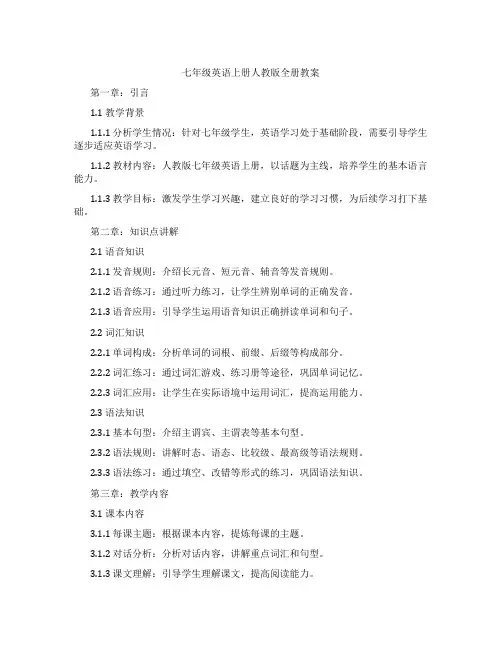
七年级英语上册人教版全册教案第一章:引言1.1 教学背景1.1.1 分析学生情况:针对七年级学生,英语学习处于基础阶段,需要引导学生逐步适应英语学习。
1.1.2 教材内容:人教版七年级英语上册,以话题为主线,培养学生的基本语言能力。
1.1.3 教学目标:激发学生学习兴趣,建立良好的学习习惯,为后续学习打下基础。
第二章:知识点讲解2.1 语音知识2.1.1 发音规则:介绍长元音、短元音、辅音等发音规则。
2.1.2 语音练习:通过听力练习,让学生辨别单词的正确发音。
2.1.3 语音应用:引导学生运用语音知识正确拼读单词和句子。
2.2 词汇知识2.2.1 单词构成:分析单词的词根、前缀、后缀等构成部分。
2.2.2 词汇练习:通过词汇游戏、练习册等途径,巩固单词记忆。
2.2.3 词汇应用:让学生在实际语境中运用词汇,提高运用能力。
2.3 语法知识2.3.1 基本句型:介绍主谓宾、主谓表等基本句型。
2.3.2 语法规则:讲解时态、语态、比较级、最高级等语法规则。
2.3.3 语法练习:通过填空、改错等形式的练习,巩固语法知识。
第三章:教学内容3.1 课本内容3.1.1 每课主题:根据课本内容,提炼每课的主题。
3.1.2 对话分析:分析对话内容,讲解重点词汇和句型。
3.1.3 课文理解:引导学生理解课文,提高阅读能力。
3.2 拓展内容3.2.1 相关话题:针对课本内容,拓展相关话题。
3.2.2 听力练习:选择合适的听力材料,提高学生听力水平。
3.2.3 口语表达:组织口语交流活动,提高学生口语表达能力。
第四章:教学目标4.1 知识目标4.1.1 掌握基本的语音、词汇和语法知识。
4.1.2 能够听懂、说出一日常用语。
4.1.3 理解课本内容,具备一定的阅读和写作能力。
4.2 能力目标4.2.1 提高学生的听、说、读、写四项基本技能。
4.2.2 培养学生的语言运用能力和团队协作能力。
4.2.3 培养学生的跨文化交际意识。
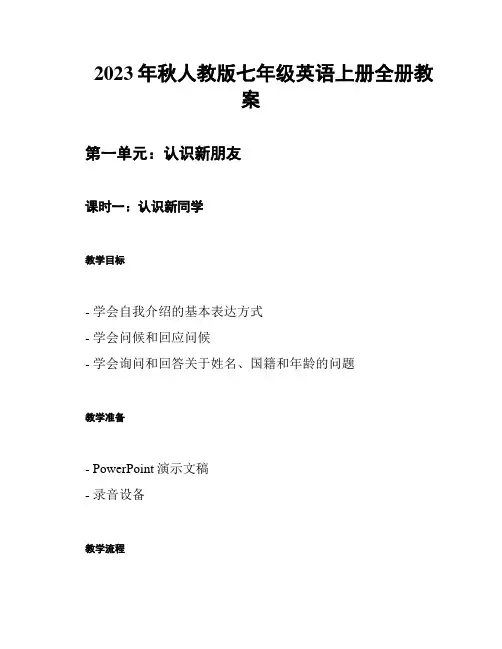
2023年秋人教版七年级英语上册全册教案第一单元:认识新朋友课时一:认识新同学教学目标- 学会自我介绍的基本表达方式- 学会问候和回应问候- 学会询问和回答关于姓名、国籍和年龄的问题教学准备- PowerPoint演示文稿- 录音设备教学流程1. 热身活动:师生互动问候,学生之间自我介绍2. 向学生展示自我介绍的范文3. 播放录音,让学生模仿录音中的自我介绍4. 组织学生进行小组活动,互相询问姓名、国籍和年龄,并进行回答5. 教师在互动活动中进行评价和纠正,引导学生使用正确的表达方式教学扩展- 角色扮演:学生们分成小组进行角色扮演,练自我介绍和互相问候- 家庭作业:要求学生写一篇关于自己的自我介绍,包括姓名、国籍和年龄课时二:我的学校教学目标- 学会用简单的形容词描述学校的特点- 学会询问和回答关于学校的问题- 学会运用句型"What's this/that?"和"It's a/an..."教学准备- PowerPoint演示文稿- 实物或图片展示学校的不同场景和物品教学流程1. 热身活动:回顾上节课所学的自我介绍,学生之间互相询问姓名、国籍和年龄2. 展示学校的图片和实物,引导学生用"What's this/that?"和"It's a/an..."的句型来询问和回答3. 教师介绍形容词,并让学生用形容词描述学校的不同场景和物品4. 组织学生进行小组活动,让他们互相描述自己所在学校的特点5. 教师在互动活动中进行评价和纠正,引导学生使用正确的句型和词汇教学扩展- 画画比赛:学生们用画画的方式描述自己喜欢的学校场景,并进行展示和比较- 家庭作业:要求学生写一篇关于自己学校的简短介绍,并包括一些形容词描述---以上是第一单元的教案内容,详细的教学步骤和教学资源可以根据实际情况进行调整和补充。
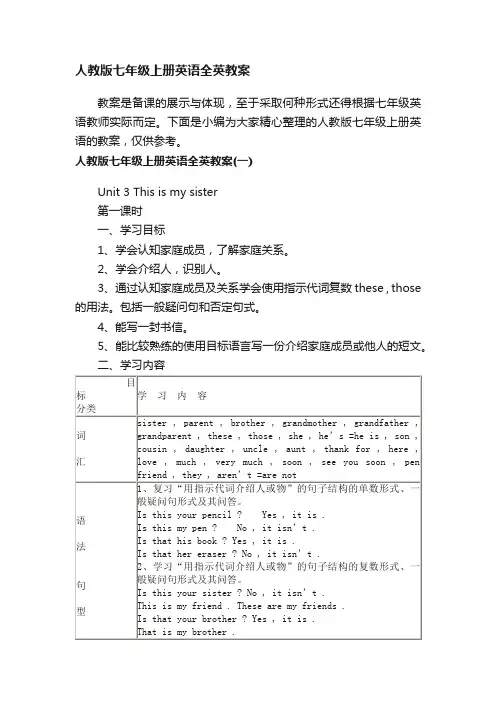
人教版七年级上册英语全英教案教案是备课的展示与体现,至于采取何种形式还得根据七年级英语教师实际而定。
下面是小编为大家精心整理的人教版七年级上册英语的教案,仅供参考。
人教版七年级上册英语全英教案(一)Unit 3 This is my sister第一课时一、学习目标1、学会认知家庭成员,了解家庭关系。
2、学会介绍人,识别人。
3、通过认知家庭成员及关系学会使用指示代词复数these , those 的用法。
包括一般疑问句和否定句式。
4、能写一封书信。
5、能比较熟练的使用目标语言写一份介绍家庭成员或他人的短文。
二、学习内容三、朗读单词1. sister n. 姐;妹2. parent n. 父或母3. brother n. 兄;弟4. grandmother n. 祖母;外祖母5. grandfather n. 祖父;外祖父6. grandparent n. 祖父/ 母;外祖父/母7. these pron . & adj.这些8. those pron . & adj.那些9. she pron .她10. he’s =he is11. son n.儿子12. cousin n.堂(表)兄弟;堂(表)姐妹13. daughter n. 女儿14. uncle n.叔;伯;舅;姨父;姑夫15. aunt n. 姨母;姑母;伯母;婶母16. thank for为……而感谢17. here adv.在这里;向这里18. love v.爱;热爱19. much adv. 很;非常20. very much 很;非常21. soon adv.不久22. see you soon ,再见。
23. pen friend 笔友24. they pron. 他(她;它)们25. aren’t =are not四、任务示范Show the Ss some pictures , point at the pictures and tell them like this :This is my father / mother / brother / sister ……That’s my sister / grandmother / grandfather ……Then ask the Ss to bring their families’ pictures and introduce people in this way .五、布置作业1、请同学们反复朗读单词,并自查能记住多少单词。
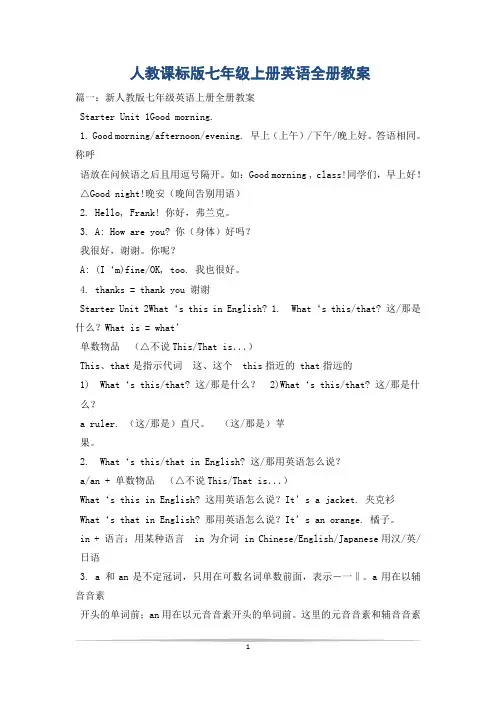
人教课标版七年级上册英语全册教案篇一:新人教版七年级英语上册全册教案Starter Unit 1Good morning.1. Good morning/afternoon/evening. 早上(上午)/下午/晚上好。
答语相同。
称呼语放在问候语之后且用逗号隔开。
如:Good morning , class!同学们,早上好!△Good night!晚安(晚间告别用语)2. Hello, Frank! 你好,弗兰克。
3. A: How are you? 你(身体)好吗?我很好,谢谢。
你呢?A: (I‘m)fine/OK, too. 我也很好。
4. thanks = thank you 谢谢Starter Unit 2What‘s this in English? 1. What‘s this/that? 这/那是什么?What is = what’单数物品(△不说This/That is...)This、that是指示代词这、这个 this指近的 that指远的1) What‘s this/that? 这/那是什么? 2)What‘s this/that? 这/那是什么?a ruler. (这/那是)直尺。
(这/那是)苹果。
2. What‘s this/that in English? 这/那用英语怎么说?a/an + 单数物品(△不说This/That is...)What‘s this in English? 这用英语怎么说?It’s a jacket. 夹克衫What‘s that in English? 那用英语怎么说?It’s an orange. 橘子。
in + 语言:用某种语言 in 为介词 in Chinese/English/Japanese用汉/英/ 日语3. a 和an是不定冠词,只用在可数名词单数前面,表示―一‖。
a用在以辅音音素开头的单词前;an用在以元音音素开头的单词前。
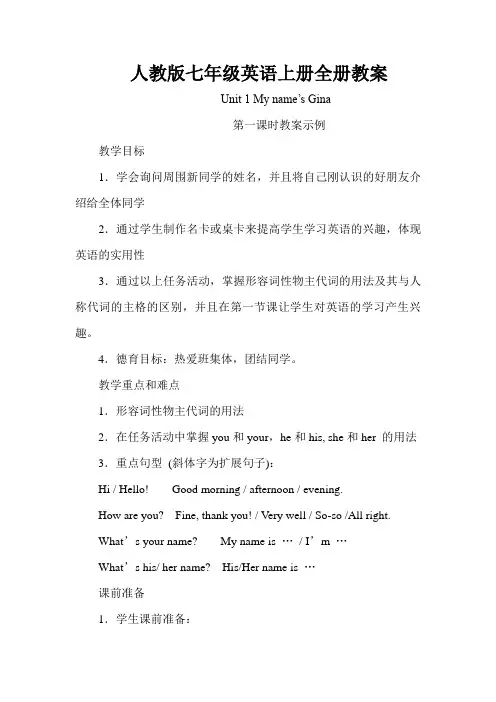
人教版七年级英语上册全册教案Unit 1 My name’s Gina第一课时教案示例教学目标1.学会询问周围新同学的姓名,并且将自己刚认识的好朋友介绍给全体同学2.通过学生制作名卡或桌卡来提高学生学习英语的兴趣,体现英语的实用性3.通过以上任务活动,掌握形容词性物主代词的用法及其与人称代词的主格的区别,并且在第一节课让学生对英语的学习产生兴趣。
4.德育目标:热爱班集体,团结同学。
教学重点和难点1.形容词性物主代词的用法2.在任务活动中掌握you和your,he和his, she和her 的用法3.重点句型(斜体字为扩展句子):Hi / Hello! Good morning / afternoon / evening.How are you? Fine, thank you! / Very well / So-so /All right.What’s your name? My name is …/ I’m …What’s his/ her name? His/Her name is …课前准备1.学生课前准备:利用网络查阅中英文姓名及初次见面时各国或各地风俗,礼仪体会它们的不同之处;准备硬纸片和水彩笔;用英文介绍自己的姓、名。
2.教学器材:录音机、电脑、图片。
3.教学课件:中英文名字展示片。
教学设计Tasks Students’ activities Teacher’s activities1. Game: ask and answer the question: What’s your name? Students make a self-introduction and pass the sentences one by one. At first, teacher makes a self-introduction.2.Two students act out how to greet people. Act out the greeting forms they are familiar with or they find on net. Show the students the pictures of other countries’customs with computer.3. See who can make the most friends and get the most information. Then report their results with his or hers. Move around to make friends with the ones they are interested in. Make the students move around to make friends with others.4. Design and make their name cards . Design and make their name cards in groups. Ask them to design their name cards and see which group is the best.教学过程设计任务一:结识新朋友。
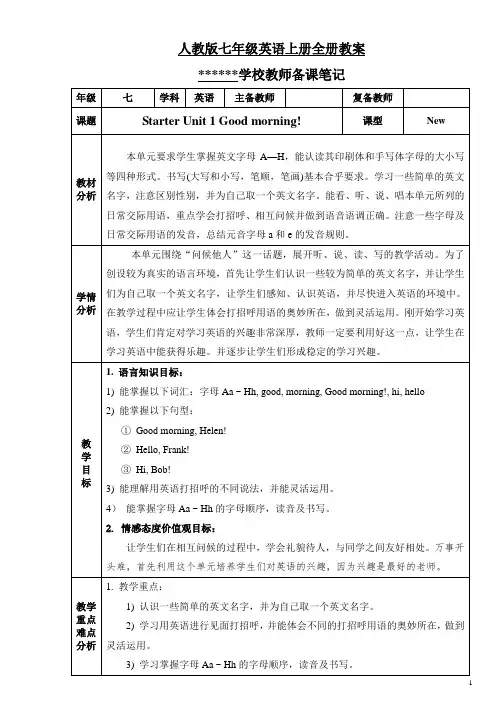
人教版七年级英语上册全册教案******学校教师备课笔记学校教师备课笔记Revise some school things byasking questions. e.g.: What ’s this? Is this a …? How do you spell it?etc.Learn the new words in, on, under, behind … by helping the teacher find the lost things. e.g.: T: Where ’s my English book? S1: It ’s here. / I think it ’s …T: Oh, it ’s on the desk. … T: Where ’re my color pencils? S2: … Teach the new word “where ” and the use of “they ”. Consolidate the prepositions by looking at thescreen and answer thequestions: Where ’s … ?Where ’re …?Hide and look for thingsShow the students a picture of a room, tell them this is a bedroom, let the students list the things in it first. Then show them the whole picture, teach the new words, ask where the things are, let the students answer, using the prepositions.Repeat with a sitting room and a study, teach the new words and practice in the same way.Section A, 1a: Match the words with the things in the picture. Students do it individually first, then check the answers. Section A, 1c: Make up dialogues in pairs, using the things in the picture.Chatting. Chat with the students about the things around the room by showing them pictures. Ask the students to spell the new words. Section A, 2a. Revise what the things are. Play the tape for students and let them number them. Section A, 2b. Play the tape again, students number the things [1-6] in the picture. Imitate the dialoguesSection A, 2c. Look at the picture in 2b again. Students use general questions to ask and answer about the things in it.Ask some students to report their answer like this: In Picture 1, the pencil case is …In Picture 2, the pencil case is…; In Picture 1, the books are …In Picture 2, the books are …Present short dialogues, using pictures or objects to help. Dialogue 1: A: Where’s my bag? B: I don’t know. Is it on the sofa? A: No, it isn’t. Dialogue 2: A: Where’re my books? B: I don’t know. Are they on the bed? A: Yes, they are. Teach “don’t =do not”, “know”. Check the homework in Period One. Make reports to share the information they got from the friends or teachers, and give their simply assessment.Let the students makesimilar dialogues according to the pictures in Section A, 3a&3c. Put the dialogue in the right order.( Section A, 3a.) Listen and imitate the dialogues in Section A, 1b.answer make similar dialogues according to the pictures in Section A, 3a&3c.Ask some pairs to act out the dialogues in Section A, 2a & 2b. Show the students a picture of a room. Let the students say likethis: The ID card is on the table. The books are on the chair. Let some able students list some new words. Practice reading them. Match the new words with the things in thepicture. (Section B, 2a.) Pairwork. Talk about the picture.( Section B, 1b&1c.)Play the tape twice for students to listen and circle the things Tommy wants from his room. Check the answers. ( Section B, 2a. )Listen again.Show a picture of a roomwith a few things in it, give the students a short note about the things around the room to read, let the students try to find out thedifferences between the reading material and the picture. Circle the mistakesin the reading material. Make an orally report by looking at the picture again. The students read the note silently and draw the missing things in the picture. ( Section B, 3a.) (为了节省时间,教师可以让学生在图中标出数字来替代画图。
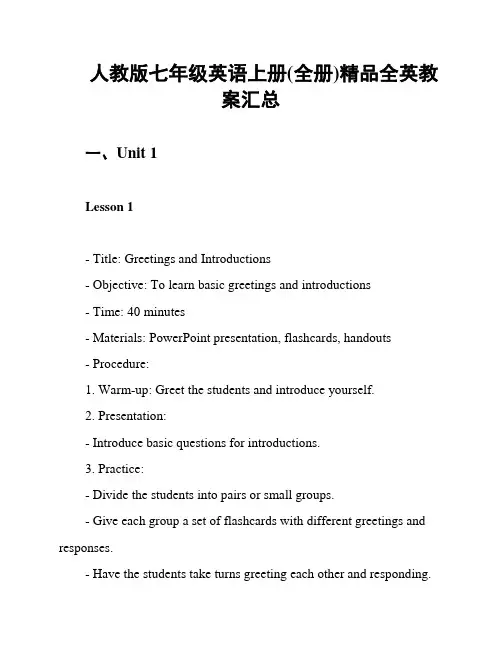
人教版七年级英语上册(全册)精品全英教案汇总一、Unit 1Lesson 1- Title: Greetings and Introductions- Objective: To learn basic greetings and introductions- Time: 40 minutes- Materials: PowerPoint presentation, flashcards, handouts- Procedure:1. Warm-up: Greet the students and introduce yourself.2. Presentation:- Introduce basic questions for introductions.3. Practice:- Divide the students into pairs or small groups.- Give each group a set of flashcards with different greetings and responses.- Have the students take turns greeting each other and responding.4. Production:- Distribute handouts with a list of questions for introductions.- Have the students interview each other using the questions.5. Conclusion: Recap the lesson and highlight key phrases.Lesson 2- Title: Numbers and Classroom Objects- Objective: To learn numbers and classroom objects- Time: 45 minutes- Materials: PowerPoint presentation, flashcards, real objects- Procedure:1. Warm-up: Review the greetings from the previous lesson.2. Presentation:- Introduce numbers 1-100 using visual aids.- Teach vocabulary related to classroom objects.3. Practice:- Show flashcards with different numbers and have the students say them aloud.- Bring in real classroom objects and ask the students to identify them.4. Production:- Divide the students into groups.- Give each group a set of number flashcards and object cards.- Have the students match the numbers with the corresponding objects.5. Conclusion: Recap the lesson and review the vocabulary.二、Unit 2Lesson 1- Title: Personal Information- Objective: To learn how to talk about personal information- Time: 40 minutes- Materials: PowerPoint presentation, worksheets- Procedure:1. Warm-up: Review the numbers from the previous unit.2. Presentation:- Teach vocabulary related to personal information (name, age, nationality, etc.).- Introduce basic sentence structures for talking about personal information.3. Practice:- Distribute worksheets with fill-in-the-blank sentences.4. Production:- Divide the students into pairs.- Instruct them to interview each other and ask about personal information.5. Conclusion: Recap the lesson and encourage the students to practice asking and answering questions about personal information.Lesson 2- Title: Colors and Clothes- Objective: To learn colors and clothing vocabulary- Time: 45 minutes- Materials: PowerPoint presentation, flashcards, colored paper - Procedure:1. Warm-up: Review the vocabulary from the previous lesson.2. Presentation:- Introduce basic colors using visual aids.- Teach vocabulary related to clothing.3. Practice:- Show flashcards with different colors and have the students say them aloud.- Show flashcards with different clothing items and have the students identify them.4. Production:- Give each student a piece of colored paper.- Instruct them to draw and label a piece of clothing using the color of the paper.5. Conclusion: Recap the lesson and review the vocabulary.三、Unit 3... (continue to provide summaries for each lesson in Unit 3 and subsequent units)Please note that the above are just examples of how the document could be structured. You can provide detailed summaries of each lesson in the "Unit X" section, following a similar format. Remember to adapt the content to fit the actual lessons and materials provided in the textbook.。
最新整理人教版七年级上册英语全册教学设计全册教案教学目标- 帮助学生掌握人教版七年级上册英语的全部知识点和技能- 提高学生的英语听、说、读、写能力- 培养学生积极参与英语课堂活动的意识和能力教学内容- Unit 1: My New School- Unit 2: This is my sister.- Unit 3: Is this your pencil?- Unit 4: What's this in English?- Unit 5: What color is it?- Unit 6: How much are these socks?- Unit 7: Can I try it on?- Unit 8: I'd like some noodles.- Unit 9: What does he look like?- Unit 10: How was your weekend?教学计划第一课时- 教学目标:研究与介绍自己的姓名和所属学校- 教学内容:Unit 1 - Section A- 教学步骤:1. 师生互相问候2. 导入新课内容3. 学生自我介绍并描述自己的学校4. 练对话和句型5. 小组活动:编写自我介绍对话6. 总结本课内容第二课时- 教学目标:研究谈论家庭成员的表达方式- 教学内容:Unit 2 - Section A- 教学步骤:1. 复上节课内容2. 导入新课内容3. 研究家庭成员的表达方式4. 练对话和句型5. 小组活动:描述自己的家庭成员6. 总结本课内容第三课时- 教学目标:研究谈论物品归属的表达方式- 教学内容:Unit 3 - Section A- 教学步骤:1. 复上节课内容2. 导入新课内容3. 研究物品归属的表达方式4. 练对话和句型5. 小组活动:描述物品归属关系6. 总结本课内容...(继续编写后续课时详情)教学评估- 在每节课结束时进行随堂测验,以检查学生对本节课内容的理解和掌握程度- 定期进行小测验,检查学生对整个教材内容的掌握程度教学资源- 人教版七年级上册英语教材- 音频文件- PPT课件- 黑板和粉笔教学方法- 任务型教学法- 合作研究法- 游戏化教学法- 直观教学法教学成果评价- 学生课堂表现评价- 学生成绩考核评价- 学生研究态度评价教学反思与改进- 教师需要定期反思自己的教学方法和教学效果,不断改进教育教学水平。
七年级英语上册全英文教案(全册)Unit 1 My name's Gina.一、单元教材分析本单元围绕“结交新朋友”使学生学会打招呼和介绍自己、询问他人姓名的基本句型:“What’s your/his/her name?My/His/Her name is …”; 通过学习区分"First/last name”,了解有关姓名的文化知识;通过查询电话号码“What’s your/her/his phone number?”,学习数字1~9,同时也进一步促进学生之间的相互了解;通过以上几个方面的学习,使学生在轻松、愉快的学习氛围中熟识新伙伴。
本单元与第二单元衔接紧密:由课堂内的打招呼、自我介绍到课外、校外相互了解。
由特殊疑问句的学习到一般疑问句的学习,使学生将书本知识运用到实际生活中。
二、单元学情分析本单元的主题是熟识新伙伴,同时引导学生采用Practicing, Listening for specific information和Role playing的学习策略,学习一些新词汇,掌握一些重点句型,在小组合作学习的过程中,进一步促进学生之间的相互了解。
三、单元教学建议本单元可综合运用讲授式、启发式、自主学习、合作学习等各种策略,提供大量的学习资源,通过老师向学生进行的自我介绍,同学自我介绍传句子比赛,自我查资料表演,自制明信片等的活动,使学生能够学到知识,又增加了他们的学习的乐趣。
来培养学生的自主学习的能力及表达能力和逻辑思维能力。
采用Practicing, Listening for specific information和Role playing的学习策略,利用教学图片或制作多媒体课件来展开课堂Pair work, Group work的口语交际活动,询问他人姓名、查询电话号码,了解有关姓名的文化知识。
四、单元课时分配本单元可用4课时完成教学任务:Section A (1a-2d) 用1课时Section A (Grammar Focus-3c) 用1课时Section B (1a-2c) 用1课时Section B (3a-Self Check) 用1课时Section A (1a-2d)一、教学目标:1. 语言知识目标:1) 能掌握以下单词:name nice meet his and her your能掌握以下句型:① —Hi. My name’s Gina. —I’m Jenny. Nice to meet you!① —What’s your/his/her name? —My/his her name is…① —Are you…? —Yes, I am. / No, I'm not.① —Is he/she…? —Yes, she/he is. / No, she/he isn’t.2) 能了解以下语法:your, his, her等形容词性物主代词的简单用法;What’s=what is I’m=I am name’s=name is等缩写形式。
七年级英语上册人教版全册教案第一章:Unit 1 My name's Gina.教学目标:1. 能够听懂、说出一系列关于个人信息的问题和答案。
2. 能够正确使用人称代词和形容词性物主代词。
3. 能够通过图片和情景理解简单的英语对话。
教学内容:1. 引入新课:通过一张包含不同人种的图片,让学生观察并讨论。
2. 展示教材插图和单词卡片,引导学生学习生词。
3. 讲解人称代词和形容词性物主代词的用法。
4. 分组练习对话,让学生模拟情景,进行角色扮演。
5. 完成课本练习题,巩固所学内容。
第二章:Unit 2 This is my sister.教学目标:1. 能够听懂、说出关于家庭成员的英语单词和短语。
2. 能够正确使用指示代词和形容词性物主代词。
3. 能够描述家庭成员的外貌特征。
教学内容:1. 引入新课:通过一张包含家庭成员的图片,让学生观察并讨论。
2. 展示教材插图和单词卡片,引导学生学习生词。
3. 讲解指示代词和形容词性物主代词的用法。
4. 分组练习对话,让学生模拟情景,进行角色扮演。
第三章:Unit 3 Please open the window.教学目标:1. 能够听懂、说出关于日常生活中的祈使句。
2. 能够正确使用动词短语。
3. 能够根据情景进行简单的交际。
教学内容:1. 引入新课:通过一个日常生活中的场景,让学生观察并讨论。
2. 展示教材插图和单词卡片,引导学生学习生词。
3. 讲解祈使句的用法和动词短语的构成。
4. 分组练习对话,让学生模拟情景,进行角色扮演。
5. 完成课本练习题,巩固所学内容。
第四章:Unit 4 Is this your schoolbag?教学目标:1. 能够听懂、说出关于物品所有格的英语单词和短语。
2. 能够正确使用一般疑问句和回答。
3. 能够描述物品的特征。
教学内容:1. 引入新课:通过一张包含不同物品的图片,让学生观察并讨论。
2. 展示教材插图和单词卡片,引导学生学习生词。
人教版七年级上册英语教案16篇人教版七年级上册英语教案(精选篇1)一、复习指导思想新授课结束后,期末考试前,指导学生进行期末复习,主要复习基础知识,提高做题能力,训练阅读、听力与写作,使学生能够举一反三,熟练掌握知识点与考点.二、学生学习水平现状分析学生的主要问题是基础薄弱,做题能力参差不齐,优秀的学生不多,成绩有待于提高的学生比较多,一部分同学学习惰性强。
三、复习时间:十七周至十八周(共10课时)四、复习重点1、基础知识:unit1—unit8:重点词汇、短语、句型2、语法:(1)动词不定式(2)动名词(3)被动语态(4)形容词相关句型的运用(5)副词的运用(6)原因状语从句(7)过去进行时3、阅读训练(报纸阅读材料)4、听力(报纸、导学案套题听力训练)5、话题写作:肢体语言,义务工作,传统技艺,卡通漫画、动物保护、动物描写、未来生活畅想6、复习中注重讲练结合,及时反馈,及时检测五、课时安排时间为两周,具体计划如下:十七周(周一)unit1、2重点词组句型小结;语法训练(报纸2、3版)十七周(周二)unit1、2知识点练习,话题写作训练(报纸4版)十七周(周三)unit3、4重点词组句型小结;语法训练(报纸5、6版)十七周(周四)unit3、4知识点练习,话题写作训练(报纸7版)十七周(周五)unit5、6重点词组句型小结;语法训练(报纸8、9版)十八周(周一)unit5、6知识点练习,话题写作训练(报纸10版)十八周(周二)unit7、8重点词组句型小结;语法训练(报纸11、12版)十八周(周三) unit7、8知识点练习,话题写作训练(报纸13版)十八周(周四)模拟套题(报纸31版)(综合测试一)十八周(周五)模拟套题(报纸32版)(综合测试二)六、复习措施1、单词过关。
每天重点句子听写2、语法复习注重讲练结合,引导学生说出重点与易错点3、加强整理英语学习档案4、对于阅读训练有指导,有检测。
人教版初中七年级上册英语教案(完整版)一、教学内容Unit 1 你好Lesson 1 你好吗1. 教学目标:- 研究如何问候和回应问候的方式- 掌握与他人交流的基本问答方式- 学会用英语自我介绍2. 教学重点:- 掌握如何用英语问候和回应问候的方式- 学会在对话中使用一些常见的英语短语- 能够简单介绍自己的姓名、国籍和年龄3. 教学过程:- 导入新课,引导学生复英语问候语- 引入新的问候方式和回应,通过示范和练加深学生理解- 分组进行对话练,鼓励学生运用新学的问候方式与他人交流- 引导学生进行自我介绍,帮助他们掌握相关的英语表达4. 板书设计:- 问候语- Hello!- Hi!- How are you?- I'm fine, thank you.- 自我介绍- My name is [name].- I am from [country].- I am [age] years old.5. 作业要求:- 完成课堂练册上的相关练- 准备下节课的自我介绍Lesson 2 你是谁(以下内容略去不写)Unit 2 我的家(以下内容略去不写)二、教学目标在初中七年级上册英语教学中,我们旨在通过教授Unit 1和Unit 2的内容,帮助学生学会基本的英语问候和自我介绍方式,以及描述家庭成员和家庭的基本词汇。
通过各种实践活动和练,学生将能够在日常生活中简单地应用这些英语表达方式。
三、教学方法- 情景教学法:通过创设真实情景,引导学生使用所学知识进行对话练。
- 归纳法:通过提供示范和练,让学生总结语言规律和表达方式。
四、教学资源- 人教版初中英语教材《七年级上册》- 课件和多媒体设备- 课堂练册五、教学评估通过课堂练、对话练和个人介绍的方式,对学生对所学内容的掌握程度进行评估。
六、教学反馈及时反馈学生的研究情况,鼓励他们在研究过程中的积极表现,并针对学生的不足之处提出改进建议。
七、教学改进根据学生的研究情况和反馈意见,不断优化课堂教学过程,提高学生的研究效果。
Starter Unit 1 Good morning!授课班级授课日期授课类型Starter Unit 1新授课学时数The First Period ( 1a—1c)教学目标1. Knowledge and abilitiesLet students know the eight English names and remember them.Let students know how to greet people in the morning.2. Process and methodsThrough listening and reading, let students grasp the simple greetings.3. Emotion, attitude and valuesMotivate students’interests of learning English.教学内容学习八个人名。
Alice, Bob, Cindy, Dale, Eric, Frank, Grace, Helen学习打招呼的用语:Hello!/ Good morning!重点难点八个人名Alice, Bob, Cindy, Dale, Eric, Frank, Grace, Helen句型:Hello! Good morning!教学方法任务型教学、直观教学法、模仿示范法、情景教学和合作学习法教学用具图片、黑板、录音机教学过程设计备注教学步骤Step1. Warming-up1.T wears a name card with an English name on it, then points to the name card and have an introduction.2. Greet the whole class and help them to say,Hello, … Good morning,师生初次见面,教师通过自我介绍和问候学生,让学生放轻松,消除与教师间的陌生感,开始亲近教师。
Starter Unit 1 Good morning!授课班级授课日期授课类型Starter Unit 1新授课学时数The First Period ( 1a—1c)教学目标1. Knowledge and abilitiesLet students know the eight English names and remember them.Let students know how to greet people in the morning.2. Process and methodsThrough listening and reading, let students grasp the simple greetings.3. Emotion, attitude and valuesMotivate students’interests of learning English.教学内容学习八个人名。
Alice, Bob, Cindy, Dale, Eric, Frank, Grace, Helen学习打招呼的用语:Hello!/ Good morning!重点难点八个人名Alice, Bob, Cindy, Dale, Eric, Frank, Grace, Helen句型:Hello! Good morning!教学方法任务型教学、直观教学法、模仿示范法、情景教学和合作学习法教学用具图片、黑板、录音机教学过程设计备注教学步骤Step1. Warming-up1.T wears a name card with an English name on it, then points to the name card and have an introduction.2. Greet the whole class and help them to say,Hello, … Good morning,师生初次见面,教师通过自我介绍和问候学生,让学生放轻松,消除与教师间的陌生感,开始亲近教师。
Step2. Play a game.T gets ready for a list of English names for boys and girls.Play the game like this:T says a letter, for example C, then let the Ss tell the letters which is before and after C.The one who says B, D first is the winner. The winner can get a chance to choose an English name first or he can give the chance to his friend.绝大多数学生都会背诵26个字母表,因此学生参与这个游戏会相当积极。
通过这个游戏首先可以锻炼他们迅速反应的能力;以英语名字作为奖励,也使学生较有新鲜感,让他们自己选择自己的名字,使他们会更容易记住自己的名字。
Step3. Presentation.Show a picture of a girl and give the name under the picture, teach Alice. In the same way teach the other seven names.图画和名字结合起来,加强学生的感性认识,有助于记忆。
并为后面的游戏做好了铺垫。
Step4.GameShow the pictures of these eight children as quickly as possible. Let the Ss tell the names of these children. ( The winner can have a chance to choose an English name.) 通过闪现头像来测试学生对这八个人物的特征和名字的记忆,有助于锻炼他们的反应力和注意力。
Step5. Work on 1a.Write down the names in the picture . 通过名字的总结,让学生进一步巩固所学的人名。
Step5. Presentation.Show a picture with Eric, let Ss guess what Eric wants to say to us. The answer is : Hello! or Good morning. Then help them to say: Hello, Eric! or Good morning, Eric. 通过图画上的场景让学生进行猜测,满足学生的好奇心,也让他们了解Good morning的使用。
Step6. Work on 1b.Play the recording for the first time, Ss only listen. 先听后读,培养学生学习Play the recording a second time. Ss repeat. 英语的良好习惯。
Step7. Work on 1c.Ss practice the conversations in pairs. T movesaround the classroom when Ss are practicing.Give them some help if needed.Ask Ss to practice greeting each other. Theycan use their Chinese names if they wish.Encourage them to use their English names ifthey can. Ask them to practice using all thedifferent greetings taught in Activity 1a.鼓励学生尽可能用自己刚才得到的英语名字进行操练,不会读的可以请教老师。
当然允许他们使用自己的中文名字进行练习。
关键是要鼓励学生大胆开口,愿意说的良好习惯。
小结与作业课堂小结Blackboard Design:Starter Unit1 Good morning!(Ⅰ)1. 词汇:Names: Bob, Alice, Cindy, Frank, Eric, Dale, Helen,Grace.2. 句型:Good morning, Alice! Good morning, Cindy!Hi, Bob ! Hello, Frank !HomeworkMake a name card like the teacher’s by themselves and learn how to read their own names.授课班级授课日期授课类型Starter Unit 1新授课学时数The Second Period ( 2a—2e)教学目标1. Knowledge and abilitiesLet students know the right pronunciation and the writing ways of Letters Aa-Hh.Let students remember the meanings of some short Big Letters.2. Process and methodsThrough listening reading and writing, let students grasp the eight English letters.3. Emotion, attitude and valuesMotivate students’interests of learning English.教学内容学习Aa --- Hh八个字母。
巩固八个人名。
Alice, Bob, Cindy, Dale, Eric, Frank, Grace, Helen重点难点Aa --- Hh的字母教学。
教学方法任务型教学、直观教学法、模仿示范法、情景教学和合作学习法教学用具字母卡片、黑板、录音机教学过程设计备注教学步骤Step1. Warming-upGreet all the Ss with : Hello, … or Good morning, … using their English names.(Ask all the students to wear their name cards like T) At the same time let them repeat their names and try to remember their names.让学生佩戴名字卡,可以让师生早日熟悉对方,也便于学生之间的互相了解。
通过打招呼既复习了旧课,也可以让学生正确读出自己的名字,学会如何用自己名字与朋友交流。
Step2.PresentationShow different letters on the slide picture and see if they can read them. First big letters, then small letters. 因为大部分同学对字母有些了解,通过这种方式既进行了复习,也可以知道他们对哪些字母掌握不是很好,在后面的教学中加以注意。
Step3. Learn the letters. (Work on A 2a—2d)1.Listen and repeat the eight letters.2.Put all the big letters in order.3.Find the big letters for these small letters.4.Listen and number the letters they hear.5.Teach them how to write these big and small letters.6.Write the small letter for each big letter.从认读大小写字母开始,先学会正确地朗读,然后过渡到正确规范地书写,循序渐进让学生扎实巩固地掌握从Aa—Hh 这八个字母。
Step4. Game.(Which letter is missing?)Show seven big letters(from A-H) on the slide picture, see who can find the missing letter. Then show seven small letters. Ss play the game in a group of four. Everyone should get ready for two pieces of paper with seven big letters and seven small letters. 通过这个游戏既可以培养学生的反应能力,又可以巩固他们对字母的掌握。